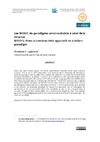Identificador persistente para citar o vincular este elemento:
https://accedacris.ulpgc.es/jspui/handle/10553/70338
| Campo DC | Valor | idioma |
|---|---|---|
| dc.contributor.author | Gérard Lojacono, Florence | en_US |
| dc.date.accessioned | 2020-02-19T07:16:54Z | - |
| dc.date.available | 2020-02-19T07:16:54Z | - |
| dc.date.issued | 2016 | en_US |
| dc.identifier.issn | 1133-1127 | en_US |
| dc.identifier.other | WoS | - |
| dc.identifier.uri | https://accedacris.ulpgc.es/handle/10553/70338 | - |
| dc.description.abstract | Les MOOC (Massive Online Open Courses) ont déjà fait couler beaucoup d’encre et cet article ne vise pas à faire le panégyrique des TICE (Technologies de l’Information et de la Communication appliquées à l’Enseignement). Il s’agit plutôt de prendre appui sur ces modalités éducatives émergentes afin de réfléchir sur le bien-fondé des critères scientifiques de la recherche en sciences de l’éducation, spécialement en FLE (Français Langue Étrangère). On montrera tout d’abord que bien des concepts actuellement présentés comme à la pointe de l’innovation pédagogique ont déjà été pensés il y a bien des années et que c’est uniquement grâce à un contexte social et technologique favorable que l’éducation 2.0 a pu voir le jour. Ce premier point invite à repenser le constructivisme, paradigme dominant en sciences de l’éducation, et à poser la question de sa pertinence dans le cadre actuel de la société de la connaissance. En effet, les caractéristiques de la pensée complexe telle que la décrit Edgar Morin permettent une prise en compte plus complète et donc plus réelle de l’équation pédagogique et annoncent la possibilité d’un nouveau paradigme, le paradigme de la reliance. | en_US |
| dc.description.abstract | Much has been written about the MOOC phenomenon (Massive Online Open Courses), however, this is not an ICTE (Information and Communications Technology for Educational purposes) panegyric that we offer here. Instead, the objective is to make the most of these emergent educational modalities in order to start a reflection on the value of scientific criteria in educational research with a focus on French as Foreign Language (FFL). We will first show that many concepts seen as cutting edge educational innovations were actually imagined many years before. Therefore, we will see that it is only thanks to a favorable historical and technological context that the 2.0 education was born. This first point invites us to re-think constructivism, the dominant paradigm for research in education, and to investigate the pertinence of this central model within the knowledge society. In fact, characteristics of complex thought, as described by Edgar Morin, allow a more integrative, thus more realistic approach of the pedagogical equation and announce the possibility of a new paradigm: the “reliance” paradigm. | en_US |
| dc.language | fra | en_US |
| dc.relation.ispartof | LFE. Revista de Lenguas para Fines Específicos | en_US |
| dc.source | LFE. Revista de lenguas para fines específicos [eISSN 2340-8561], v. 22 (1), p. 12-30 | en_US |
| dc.subject | 570107 Lengua y literatura | en_US |
| dc.subject | 550510 Filología | en_US |
| dc.subject.other | Constructivisme | en_US |
| dc.subject.other | Connectivisme | en_US |
| dc.subject.other | Complexité | en_US |
| dc.subject.other | Paradigme | en_US |
| dc.subject.other | MOOC | en_US |
| dc.subject.other | FLE | en_US |
| dc.subject.other | Edgar Morin | en_US |
| dc.subject.other | Reliance | en_US |
| dc.subject.other | Constructivism | en_US |
| dc.subject.other | Connectivism | en_US |
| dc.subject.other | Complexity | en_US |
| dc.subject.other | Paradigm | en_US |
| dc.title | Les MOOC: du paradigme constructiviste à celui de la reliance | en_US |
| dc.title.alternative | MOOCs: From a constructivist approach to a reliant paradigm | en_US |
| dc.type | info:eu-repo/semantics/article | en_US |
| dc.type | Article | en_US |
| dc.identifier.doi | 10.20420/rlfe.2016.0088 | en_US |
| dc.identifier.isi | 000383049500002 | - |
| dc.identifier.eissn | 2340-8561 | - |
| dc.description.lastpage | 30 | en_US |
| dc.identifier.issue | 1 | - |
| dc.description.firstpage | 12 | en_US |
| dc.relation.volume | 22 | en_US |
| dc.investigacion | Artes y Humanidades | en_US |
| dc.type2 | Artículo | en_US |
| dc.contributor.daisngid | 2664935 | - |
| dc.description.numberofpages | 19 | en_US |
| dc.utils.revision | Sí | en_US |
| dc.contributor.wosstandard | WOS:Lojacono, FG | - |
| dc.date.coverdate | 2016 | en_US |
| dc.identifier.ulpgc | Sí | es |
| dc.description.esci | ESCI | |
| dc.description.dialnetimpact | 0,0 | |
| dc.description.dialnetq | Q1 | |
| dc.description.dialnetd | D3 | |
| dc.description.erihplus | ERIH PLUS | |
| item.fulltext | Con texto completo | - |
| item.grantfulltext | open | - |
| crisitem.author.dept | Departamento de Filología Moderna, Traducción e Interpretación | - |
| crisitem.author.orcid | 0000-0001-9794-6414 | - |
| crisitem.author.fullName | Gerard Lojacono, Florence Yolande | - |
| Colección: | Artículos | |
Citas de WEB OF SCIENCETM
Citations
1
actualizado el 18-ene-2026
Visitas
50
actualizado el 11-ene-2026
Descargas
61
actualizado el 11-ene-2026
Google ScholarTM
Verifica
Altmetric
Comparte
Exporta metadatos
Los elementos en ULPGC accedaCRIS están protegidos por derechos de autor con todos los derechos reservados, a menos que se indique lo contrario.
